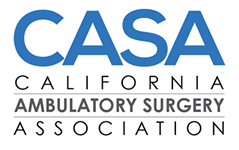Complete Story
02/14/2025
CASA Celebrates Black History Month
Member Spotlight - Dr. Martina Randall
Black History Month provides an opportunity to celebrate the significant contributions of Black medical professionals, acknowledge continuing racial disparities in health outcomes, and promote health equity. At CASA, we want to recognize the Black physicians, nurses, researchers, and healthcare professionals who have helped advance medicine and improve patient care – these people help inspire future generations of Black healthcare professionals. Promoting diversity in medicine is proven to enhance patient communication, trust, and outcomes. Additionally, Black History Month provides an opportunity to promote health screenings, disease prevention, and wellness programs tailored to Black communities.
By recognizing Black History Month, the ASC community can celebrate progress and encourage further investment in an inclusive and equitable healthcare system.
CASA Member Profile

Dr. Martina Randall, Foot and Ankle Surgeon & Sports Medicine Specialist Partner at Specialty Surgical Center of Encino
What does Black History Month mean to you as a physician in the ASC community?
Black History Month is both a celebration of progress and a reminder of the challenges that remain. As a Black surgeon and physician-owner, I am a representation of the resilience of those who came before me. It is a testament to the unyielding perseverance of generations past. Individuals who, despite systemic barriers in education, opportunity, and professional advancement, laid the foundation upon which I now stand.
Black History Month is more than honoring history, it is a call to action to uplift future generations, challenge systemic inequities, and ensure Black professionals are not only present but thriving. My career is the realization of my ancestors' aspirations, and this month reminds us that true progress is measured by the doors we open for those who follow.
Why is it important to celebrate Black contributions to healthcare?
Celebrating Black contributions to healthcare ensures that the pivotal impact of Black physicians, researchers, and leaders is recognized. From pioneering advancements in surgery and disease management to addressing health disparities, Black professionals have shaped modern medicine.
Beyond historical achievements, representation matters. It fosters trust in patient care, strengthens leadership, and inspires future generations. Honoring these contributions is not just about the past; it is about sustaining Black excellence in medicine for generations to come.
Are there any Black healthcare leaders or other mentors who have inspired your own journey into medicine?
Many Black pioneers have shaped modern medicine, including Dr. Charles Drew, whose work in blood transfusions revolutionized emergency care, and Dr. Daniel Hale Williams, who performed the first successful open-heart surgery.
Beyond these icons, my greatest inspiration is my aunt, a retired OB-GYN who practiced in St. Paul, Minnesota, for 30 years. As a Black female physician, she endured both racism and sexism while navigating a medical field that often questioned her presence, undermined her expertise, and placed barriers in her path that her white and male counterparts never faced. Yet, with unwavering perseverance and grace, she built a distinguished career, providing exceptional care while paving the way for those who would follow.
Her journey has given me a profound appreciation for how far we have come and how much further we must go. The obstacles she faced in the 1980s and 1990s were not just professional hurdles but systemic injustices, designed to limit access and advancement for Black women in medicine. Many would not have endured the relentless scrutiny, the lack of mentorship, or the burden of having to prove their worth at every turn. But she did.
Her resilience has shaped my own approach to medicine, instilling in me the values of humility, excellence, and the obligation to uplift those who come next. Her story is not just one of personal triumph but of resistance, defiance, and an unyielding commitment to breaking barriers; a legacy I carry forward with pride and purpose.
What challenges have you faced as a Black, female surgeon, and how did you overcome them?
As a Black female surgeon, I have navigated bias, underrepresentation, and the pressures of leadership. Surgery remains male-dominated, and ownership within the ASC space is even less diverse.
Implicit bias, whether from colleagues or patients, has been a persistent challenge. Early in my career, I faced skepticism not based on skill but on preconceived notions. I countered this by simply being better. Doing the work, staying late, working 10x harder, and consistently delivering excellence in surgical outcomes, leadership, and advocacy. Black women remain underrepresented in positions of power, requiring me to forge my own path, advocate for equity, and create opportunities for others. My presence in medicine is not just about breaking barriers, but about building bridges for those to come.
What can be done to help inspire the next generation of Black healthcare professionals?
To inspire the next generation of Black healthcare professionals, we must increase visibility, strengthen mentorship, expand access, and advocate for systemic change. Representation in leadership, media, and education makes success in medicine feel attainable, while mentorship provides the guidance needed to navigate challenges and seize opportunities. Expanding access through scholarships, internships, and early STEM exposure helps dismantle longstanding barriers. Meanwhile, medical institutions must address implicit bias and actively promote diversity in leadership to foster lasting change.
Importantly, diversity, equity, and inclusion do not mean lowering standards but ensuring equal opportunity. For too long, access to medical education and professional advancement has been unevenly distributed, not due to a lack of talent or capability but because of systemic exclusion. Creating a truly equitable system does not diminish excellence, it enhances it, allowing all individuals to reach their full potential based on merit, not restricted opportunity. By committing to these principles, we build a stronger, more effective, and truly inclusive healthcare system.
Have you been involved in any initiatives aimed at addressing health disparities?
Yes. I actively participate in three residency programs. These include Foot and Ankle Surgery and Internal Medicine mentoring residents, particularly those from underrepresented backgrounds to help them succeed. I also mentor minority students at Temple University, supporting them through the challenges of medical education.
What changes have you seen in healthcare regarding diversity and inclusion? How can healthcare providers and ASC facilities recognize and celebrate diversity?
Healthcare has made strides in diversity and inclusion, with increased emphasis on representation, greater awareness of health disparities, and the integration of cultural competency training to improve patient outcomes.
To foster a truly inclusive environment, ASCs and healthcare providers must go beyond acknowledgment and take deliberate action. This includes diverse hiring and leadership development, ongoing DEI training, and active engagement through mentorship and outreach. Recognizing contributions through initiatives like Black History Month and other cultural celebrations further reinforces inclusivity. Most importantly, providers must advocate for equitable care by eliminating barriers that have historically restricted access for minority patients.
By making diversity a priority at every level, healthcare providers and ASCs strengthen patient trust, improve outcomes, and create a more effective and equitable system for all.
Any other thoughts to share as CASA recognizes Black History Month?
Acknowledging and celebrating diversity is essential for the growth and success of healthcare. Black History Month is not just about honoring the past, it’s about continuing the journey toward equity. It is a call to break barriers, uplift voices, and open doors for the next generation. By doing so, we ensure that healthcare remains a space of excellence and inclusion, fostering innovation, trust, and improved patient outcomes.


